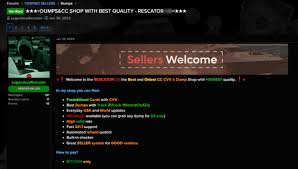The dark web is a realm that thrives on secrecy and anonymity, hosting marketplaces and platforms that most people would never encounter in their daily online lives. Among the most notorious are private credit card (CC) shops, which operate vclubshop in the shadows, selling stolen financial data, personal information, and other illicit goods. These platforms, often referred to as private CC shops, have grown increasingly sophisticated, and their transactions remain hidden from traditional oversight.
This blog delves into the world of shadow transactions, revealing what private CC shops are, how they operate, and the dangers associated with participating in them.
What Are Private CC Shops?
Private CC shops are online marketplaces that sell stolen credit card information, including CVV numbers, full card details, and sometimes complete identity packages known as “fullz.” Unlike public dark web marketplaces, these shops vclubshop login operate in a highly restricted environment. Access is often limited to vetted members, invitations, or trusted referrals.
The term “private” in this context signifies exclusivity and secrecy. Vendors on these platforms aim to minimize exposure to law enforcement and maximize profits by creating a controlled, closed ecosystem for transactions.
How Shadow Transactions Work
The transactions on private CC shops are deliberately obfuscated to avoid detection. Here’s a general overview of how these shadow transactions typically occur:
1. Membership and Access Control
Most private CC shops require potential buyers to undergo a vetting process before granting access. This can include background checks on forums, recommendations from trusted members, or even small trial transactions to prove credibility. This vetting creates an illusion of trust within a closed network.
2. Purchasing Process
Once access is granted, buyers can browse listings of stolen card data. Items often include details such as:
- Card number and expiration date
- CVV code
- Cardholder name
- Billing address
Some listings even provide additional data like social security numbers, dates of birth, or banking credentials to facilitate more extensive fraud.
The transactions are usually conducted using cryptocurrencies such as Bitcoin or Monero, further ensuring anonymity. Many shops employ escrow services to hold funds until the buyer confirms receipt of working data, adding a layer of perceived security.
3. Data Delivery
After payment, the stolen information is delivered digitally, often through encrypted messaging systems or download links that expire after a certain time. Vendors may offer “fresh” or verified data to entice repeat buyers, though the authenticity of such claims is often unverifiable.
The Appeal of Private CC Shops
Despite the obvious legal and ethical issues, private CC shops continue to attract buyers. Several factors contribute to their appeal:
- Exclusivity – Limited access creates a sense of privilege and security among members.
- Perceived reliability – Vendors often claim their data is tested and valid, making it appear trustworthy.
- High potential profits – Fraudulent use of credit card data can yield quick financial gain, enticing risk-takers.
- Community reinforcement – Dark web forums often promote certain shops, providing social validation for new buyers.
This combination of secrecy, perceived legitimacy, and potential profit explains why private CC shops maintain a persistent user base despite high risks.
Hidden Dangers and Legal Risks
Shadow transactions may seem like an alluring shortcut to wealth, but they carry significant dangers:
1. Legal Consequences
Engaging in the purchase or use of stolen credit card data is illegal worldwide. Law enforcement agencies monitor dark web transactions, and buyers can face criminal charges, fines, or imprisonment. High-profile stings have resulted in the arrest of hundreds of individuals involved in private CC shops.
2. Financial Loss
Not all private CC shops are legitimate within the criminal world. Scammers frequently operate on these platforms, taking payment without providing usable data. Even when data is delivered, it may have been canceled or otherwise compromised, leaving buyers with losses.
3. Exposure to Malware and Cyber Threats
Interacting with these platforms can expose users to malware, keyloggers, and ransomware. Many dark web vendors use malicious software to compromise buyers’ devices, either for additional theft or as a way to monitor activity.
4. Difficulty in Trusting Vendors
The private nature of these shops does not guarantee honesty. Escrow systems, reviews, and promises of verified data can be manipulated. Unlike legal marketplaces, buyers have no recourse if they are defrauded, leaving them entirely vulnerable.
Shadow Transactions vs. Public Marketplaces
Private CC shops differ from public dark web marketplaces in several key ways:
- Access Restrictions – Private shops restrict entry, whereas public marketplaces are accessible to anyone with a Tor browser.
- Vetting and Reputation Systems – Membership vetting and internal reviews create a perceived safety net.
- Lower Volume, Higher Risk – Private shops handle fewer transactions but often trade higher-value data, increasing stakes for participants.
- Enhanced Security Measures – Encryption, anonymized payment methods, and strict rules reduce exposure to law enforcement but do not eliminate risk.
This distinction explains why many serious buyers on the dark web prefer private CC shops, believing them to be safer and more profitable, even though the inherent risks remain high.
Ethical and Practical Considerations
It is critical to understand that private CC shops exist entirely outside the law and ethical boundaries. Engaging in shadow transactions supports criminal activity, including identity theft, financial fraud, and money laundering. Beyond the legal consequences, involvement in these activities contributes to widespread harm, including ruined credit, stolen identities, and significant financial losses for innocent victims.
For those curious about these platforms, research and knowledge are far safer than participation. Understanding how private CC shops operate can inform cybersecurity measures, digital safety practices, and awareness of how criminal networks function online.
Lessons Learned From Private CC Shops
Studying the world of shadow transactions offers important lessons for both individuals and organizations:
- Cybersecurity Awareness – Understanding the methods used by private CC shops can help individuals protect their personal and financial data.
- Legal Boundaries Are Non-Negotiable – Engaging in illegal digital transactions carries severe consequences.
- Risk vs. Reward – The potential “gains” from shadow transactions are heavily outweighed by legal, financial, and personal risks.
- Transparency Matters – Platforms operating in complete secrecy, especially those involving illegal activity, should always be avoided.
Conclusion
Shadow Transactions: Inside Private CC Shops sheds light on one of the most secretive corners of the dark web. These platforms promise access to stolen credit card data and other illicit information, yet they operate in a highly risky, legally perilous environment. While private CC shops may seem exclusive and lucrative, the reality is that they are breeding grounds for scams, cyber threats, and criminal liability.
The takeaway is clear: the allure of shadow transactions is far outweighed by the consequences. Awareness and knowledge are critical tools for protecting yourself in the digital age. Studying these platforms provides insight into the mechanics of cybercrime, but participation is never a safe or ethical choice.







